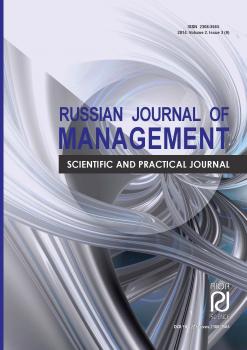graduate student from 01.01.2022 to 01.01.2025
Russian Federation
VAK Russia 5.2.3
VAK Russia 5.2.4
VAK Russia 5.2.5
VAK Russia 5.2.6
VAK Russia 5.2.7
UDC 338.23
In the context of intensive agglomeration processes, the issue of ensuring the economic security of labor-donor regions is becoming increasingly relevant. A key factor undermining their fiscal stability is the systemic outflow of tax capital, caused by the allocation of personal income tax (PIT) revenues based on the location of the employer’s registration rather than the taxpayer’s place of residence. This study addresses the challenge of quantitatively assessing this threat through the development of a comprehensive system of indicators. The aim of the research is to create a specialized toolkit that enables a comprehensive diagnosis of a donor region’s fiscal vulnerability and reveals the underlying cause-and-effect relationships affecting its economic security. The research methodology is based on a systems analysis that allowed the structuring of indicators into analytical profiles, as well as on statistical analysis methods used to develop the authors’ own calculation formulas. The informational basis consists of official data from Rosstat, the Federal Tax Service, and the Federal Treasury. The result of the work is a system of 32 indicators grouped into four profiles: fiscal, macroeconomic, entrepreneurial, and socio-demographic. The scientific novelty lies in the introduction of original calculated indicators into the academic discourse, which, for the first time, make it possible to directly quantify the threat of PIT outflow and to calculate, on this basis, an integral indicator of economic security. The proposed system is a practical tool for regional authorities, providing an objective foundation for managerial decision-making. The findings can be used to improve regional economic policy and to develop strategies for balanced spatial development in other agglomerations of the Russian Federation.
Economic security, interbudgetary relations, fiscal depletion, fiscal imbalances, agglomeration, indicator system
1. Antonov, E. V. Pendulum labor migration in the Moscow agglomeration: quantitative and qualitative characteristics // Problems of forecasting. – 2017. – No. 3. – pp. 116-129.
2. Unified Register of small and medium-sized businesses [Electronic resource] // Federal Tax Service. URL: https://rmsp.nalog.ru / (date of access: 06/26/2025).
3. Makhmutova, E. N. Assessment of losses of regional budgets from pendulum migration / E. N. Makhmutova // Economics and entrepreneurship. — 2018. — № 5 (94). — Pp. 256-260.
4. Makhrova, A. G. Spatial and temporal features of pendulum migrations in the Moscow region / A. G. Makhrova, R. A. Babkin, P. L. Kirillov // Journal of the New Economic Association. 2024. No. 2. pp. 249-256.
5. Methodology for assessing threats to the economic security of a region (subject of the Russian Federation) : methodological materials / Yu.G. Naumov, V.F. Gaponenko, E.A. Martynov, V.V. Novikov, A.V. Khudyakov, N.V. Artemyev, E.A. Sizykh. Moscow : Academy of Management of the Ministry of Internal Affairs of Russia, 2015. 72 p.
6. On the Strategy of economic Security of the Russian Federation for the period up to 2030: Decree of the President of the Russian Federation dated 05/13/2017 No. 208 // Collection of Legislation of the Russian Federation. — 2017. — No. 20. — Article 2902. — Text : direct.
7. Regions of Russia. Socio-economic indicators. 2024 : statistical collection / Rosstat. – Moscow, 2024. – 1128 p.
8. Senchagov, V. K., Mityakov, S. N. Using the index method to assess the level of economic security [Electronic resource] // Bulletin of Economic Security. — 2011. — No. 5. — URL: https://cyberleninka.ru/article/n/ispolzovanie-indeksnogo-metoda-dlya-otsenki-urovnya-ekonomicheskoy-bezopasnosti (date of access: 06/26/2025).
9. Smirnov, M. A. Assessment of the impact of pendulum migration on the budgetary security of municipalities of the Moscow region // Financial analytics: problems and solutions. — 2019. — Vol. 12, No. 1. — pp. 88-101.
10. Tatarkin, A. I., Kuklin, A. A. Changing the paradigm of regional economic security research // The economy of the region. 2012. No. 2. pp. 25-39.
11. Suglobov A.E., Dreving S.R. Socio-economic aspects of economic security and clusterization of the economy //National interests: priorities and security. 2009. Vol. 5, No. 10 (43). pp. 66-74.
12. Medvedev A.A. Basic categories and concepts in assessing the economic security of innovative production in the special economic zone // Bulletin of the Moscow University of the Ministry of Internal Affairs of Russia. 2012. No. 5. pp. 264-268.














